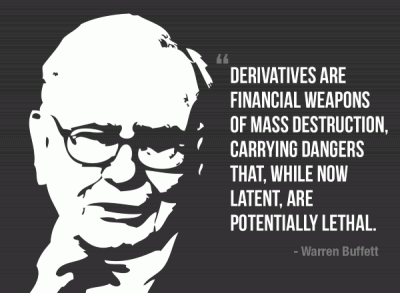Deutsche Bank CEOs “Shown Door” – World’s Largest Holder of Derivatives In Trouble?

The joint CEO’s of Germany’s largest bank, Deutsche Bank, the twelfth largest bank globally in terms of assets, unexpectedly announced their resignation over the weekend. Anshu Jain will resign at the end of this month, almost two years ahead of schedule while Juergan Fitschen will stay on until May of next year.
It is believed they resigned but some media reported that the CEOs heads had “rolled”, they were “shown the door” and Reuters reporting that Deutsche had “purged its leadership.”
The announcement followed what Deutsche Bank described as “an extraordinary meeting” over the weekend. It is particularly surprising given that Jain had been granted extra powers at the bank only two weeks ago to reorganise the scandal plagued lender.
In the past year Deutsche, like many international banks, have been found to have been engaged in a slew of corrupt practices from manipulation of interest rates, for which the firm was fined $2.5 billion in April, to tax evasion and money laundering to “mis-selling” of derivatives.
Deutsche Bank’s derivatives position is truly enormous. It was recently estimated to be around $54 trillion. Germany’s GDP, the fourth largest in the world, was a mere $3.64 trillion in 2015. Were Deutsche Bank caught off-side in its derivatives positions there is not a government or institution on earth that could bail it out and it could lead to contagion in the German financial system and indeed in the global financial system.
The contagion from such an event would be devastating. It is for this reason that Warren Buffet described derivatives as FWMD or “financial weapons of mass destruction.”
It is unnerving that the shock resignation should follow an “extraordinary meeting” over the weekend following the failure of Greece to meet its scheduled payment to the IMF on Friday.
This does not count as a Greek default but it increases the risk of a default on the amalgamated 1.5 billion euros that now must be paid by the end of June. A default and the triggering of credit default losses would cause massive volatility in financial markets and potentially destabilise an already shaky global bond market and financial system.

There have been a number of shocks to the market this year which would have been expected to have led to sharp losses in the derivatives market but slipped quietly by.
The debris caused by the massive volatility in the Swiss franc following its being unpegged from the euro – where it spiked 30% in minutes in January – seems to have been swept under the carpet. Austria’s bad bank Heta failed in late February with apparently no casualties.
We do not know what provoked the dramatic reversal in attitude to Anshu Jain at Deutsche Bank but it looks very much like the bank may be getting its house in order in anticipation of another major scandal or crisis. When said crisis breaks the responsibility can be dumped on the previous leadership.
Since Warren Buffett’s initial warning in 2002 , 13 years ago, he has been remarkably quiet on the real and growing threat to global markets and the global financial system. Despite the fact that the scale of the risk today is of an order of magnitude greater now than it was then.
This is unfortunate given the global financial system itself is far more volatile and casino-like today than it was in 2002. Sucking on the teat of Wall Street can lead to self induced omerta.
The global derivatives market is highly complex, totally unregulated and frighteningly large. One of the world’s leading derivatives experts, Paul Wilmott, who holds a doctorate in applied mathematics from Oxford University, has warned that the so-called notional value of the worldwide derivatives market is over $1.4 quadrillion.
A quadrillion is an incomprehensibly massive figure: it is 1,000 times a trillion (1 with 12 zeroes). A trillion is 1,000,000,000,000 and a quadrillion has 15 zeroes – 1,000,000,000,000,000. The annual gross domestic product of the entire planet is between $50 trillion and $60 trillion. Thus, the derivatives market’s notional value is more than 23 times the size of the value of all of the goods and services traded in global economy in one full year.
The crisis in Greece, the rumblings in the global bond market and indeed in Europe’s fourth largest bank and the threat posed by financial weapons of mass destruction should give cause for concern. It is another reason to reduce allocations to stock and bond markets and increase allocations to gold.
The real systemic risk of today is another reason to ensure owning allocated and segregated gold in the safest vaults in the safest jurisdictions in the world.

